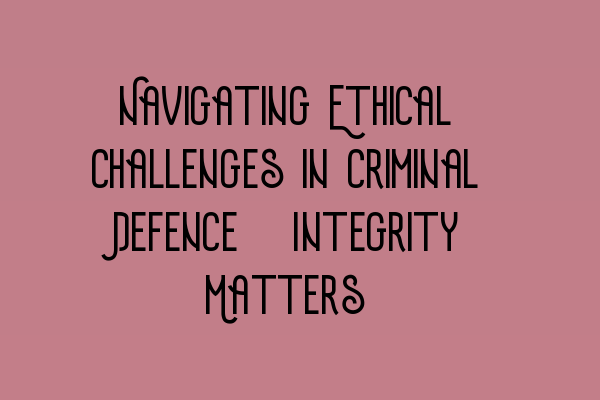Navigating Ethical Challenges in Criminal Defence: Integrity Matters
Welcome to SQE Criminal Law & Practice Law UK, where we strive to provide expert legal guidance and support to criminal defence solicitors. In this blog post, we will explore the crucial importance of integrity when facing ethical challenges in criminal defence. It is essential for legal professionals to uphold the highest standards of integrity in order to maintain their credibility and serve justice effectively.
The Role of Integrity in Criminal Defence
Integrity forms the foundation of the legal profession, especially in criminal defence. As criminal defence solicitors, our primary duty is to ensure our clients’ rights are protected and that they receive a fair trial. This duty requires us to act with utmost integrity in every aspect of our work. Upholding ethical standards helps build trust with clients, the court, and the general public.
In criminal defence, ethical challenges often arise when balancing the duty to vigorously represent the client’s interests with the responsibility to act within the boundaries of the law. Integrity guides us in making the right decisions, even when faced with complex and morally challenging situations.
Identifying Ethical Challenges
Recognizing and identifying ethical challenges is the first step in effectively navigating them. By understanding the potential conflicts and dilemmas, we can develop strategies to ensure our actions align with ethical standards. Some common ethical challenges in criminal defence include:
- Conflicts of interest
- Protecting client confidentiality
- Ensuring the client’s right to a fair trial
- Dealing with the discovery of client perjury
- Resisting external pressures
Each of these challenges requires careful consideration and adherence to ethical principles. As criminal defence solicitors, it is our responsibility to navigate these challenges while maintaining our professional integrity.
The Importance of Professionalism
Professionalism is closely linked to integrity. Demonstrating professionalism in our interactions with clients, colleagues, and the court reinforces our commitment to ethical conduct. Treating all individuals involved in the criminal justice system with respect, honesty, and fairness is crucial.
By upholding professionalism, we contribute to the overall integrity of the criminal defence profession. Moreover, professionalism enhances our credibility as legal experts and strengthens our ability to effectively advocate for our clients.
Staying Informed
Keeping abreast of legal developments and updates is vital for criminal defence solicitors. The legal landscape is constantly evolving, and it is our duty to stay informed about changes in legislation, case law, and ethical standards. This knowledge equips us to navigate ethical challenges with confidence and competence.
At SQE Criminal Law & Practice Law UK, we offer comprehensive SQE exam preparation courses to help aspiring criminal defence solicitors stay prepared and up-to-date with the latest legal knowledge. Check out our SQE 2 Preparation Courses and SQE 1 Preparation Courses to enhance your legal skills and succeed in the field.
Conclusion
Navigating ethical challenges in criminal defence requires unwavering integrity and professionalism. By prioritizing ethical principles and upholding the highest standards, we can effectively serve our clients while maintaining the credibility and integrity of the legal profession. At SQE Criminal Law & Practice Law UK, we are committed to supporting criminal defence solicitors in their pursuit of justice. For more information about SQE exams and upcoming exam dates, visit our article on SRA SQE Exam Dates.
